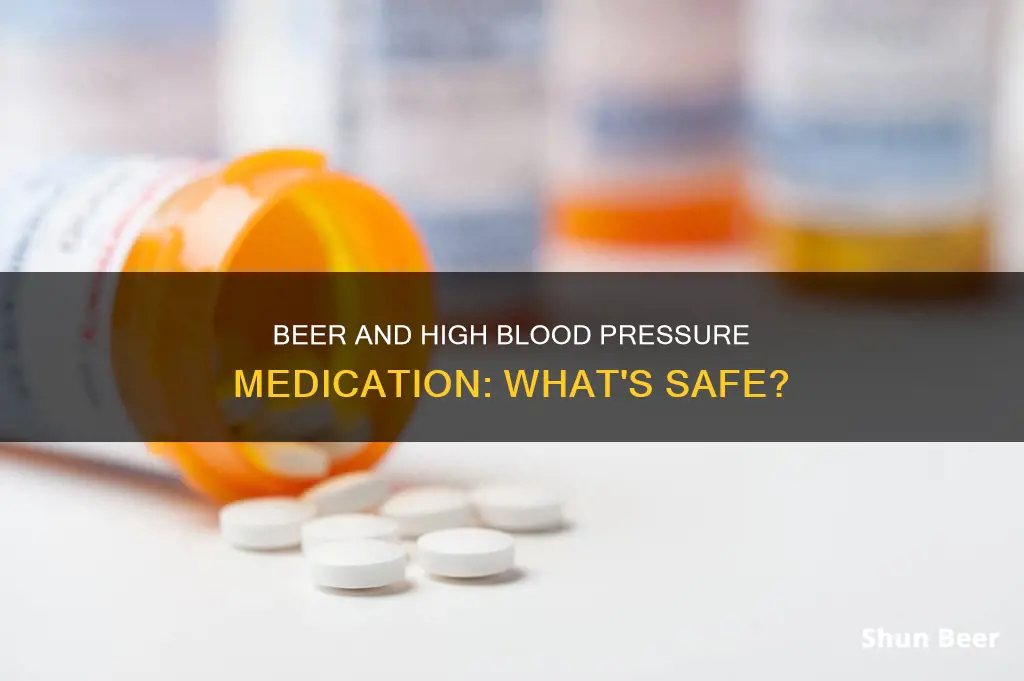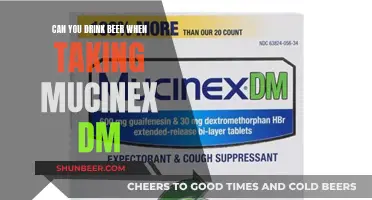
Drinking alcohol while taking high blood pressure medication is not recommended by healthcare professionals. Alcohol can increase blood pressure, making it harder to treat hypertension and reducing the effectiveness of medication. Alcohol can also intensify the side effects of medication, such as dizziness, drowsiness, and fainting. It is important to consult with a healthcare provider to understand the risks of combining alcohol with medication, as it can depend on various factors, including age, sex, and medical history.
| Characteristics | Values |
|---|---|
| Can I drink beer while taking high blood pressure medication? | It is not recommended to drink alcohol while taking high blood pressure medication. |
| Why? | Alcohol can increase the effects of blood pressure medication, causing blood pressure to drop too low (hypotension). |
| What are the risks? | Dizziness, fainting, drowsiness, severe fatigue, unstable blood pressure levels, upset stomach, nausea, vomiting, heart rhythm problems, severely low blood pressure, and liver problems. |
| What should I do? | Consult your healthcare provider to determine if it is safe for you to consume alcohol while taking high blood pressure medication. |
What You'll Learn
- Drinking alcohol while taking high blood pressure medication can cause dizziness, fainting and drowsiness
- Alcohol may also cause low blood pressure when mixed with high blood pressure medication
- Drinking alcohol while taking high blood pressure medication can lead to heart problems, including an irregular heartbeat
- Alcohol can affect how your body metabolises medication, which can lead to stronger side effects
- Alcohol can cause high blood pressure, so it may be recommended to cut back on drinking

Drinking alcohol while taking high blood pressure medication can cause dizziness, fainting and drowsiness
Drinking alcohol while taking high blood pressure medication can have several negative consequences, including dizziness, fainting, and drowsiness. These side effects can be dangerous and may increase the risk of accidents and falls.
Dizziness and lightheadedness are common side effects of high blood pressure medication, and consuming alcohol can increase the likelihood and severity of these symptoms. Alcohol can also intensify other side effects, such as sleepiness, and increase the risk of fainting. These side effects can impact your daily life and make certain activities, such as driving or operating machinery, hazardous.
Additionally, alcohol can affect how well your medication works. It may interfere with the effectiveness of high blood pressure medication, making it harder to manage your blood pressure. Alcohol can also cause low blood pressure (hypotension) when combined with certain medications, which can lead to dizziness, fainting, and heart rhythm problems.
The more alcohol you consume, the greater the risks become. It's important to discuss alcohol consumption with your healthcare provider before drinking, as the amount of alcohol that is safe for you may depend on your medical history, age, and specific medication. They can advise you on whether it is safe to consume alcohol and, if so, any precautions you should take.
It's worth noting that regularly drinking alcohol can also raise your blood pressure and contribute to weight gain, which can further increase blood pressure. Therefore, limiting alcohol intake is generally recommended for maintaining healthy blood pressure.
Beer and Glutathione: A Healthy Mix?
You may want to see also

Alcohol may also cause low blood pressure when mixed with high blood pressure medication
Alcohol may cause low blood pressure when mixed with high blood pressure medication. This is known as orthostatic hypotension, which is a sudden drop in blood pressure when you stand up from a sitting or lying down position. This can lead to dizziness, lightheadedness, fainting, and an increased risk of falls and injuries.
Drinking alcohol while taking high blood pressure medication can also cause a range of other side effects, including:
- Drowsiness
- Fast heart rate
- Heart rhythm problems (arrhythmias)
- Headaches
The combination of alcohol and high blood pressure medication can also make driving hazardous, especially if you experience drowsiness or dizziness.
It is important to consult your healthcare provider about the safety of drinking alcohol while taking high blood pressure medication, as it may depend on various factors such as your age, health status, and other medications you are taking.
Beer and Anemia: Is It Safe to Drink?
You may want to see also

Drinking alcohol while taking high blood pressure medication can lead to heart problems, including an irregular heartbeat
Drinking alcohol while taking high blood pressure medication can be dangerous. Alcohol can cause high blood pressure, and it can also affect how well your medication works. When combined with high blood pressure medication, alcohol can lead to a range of side effects, including dizziness, drowsiness, fainting, and a fast heart rate. These side effects can increase the risk of falling, which can result in injuries.
Additionally, alcohol can interfere with how your body metabolizes the medication. It is broken down in the liver, which is also responsible for breaking down medications. When you consume alcohol, it can change the way your body processes the medication, making it less effective or causing an increased concentration of the drug in your system. This can lead to more severe side effects, including heart rhythm problems (arrhythmias).
The combination of alcohol and certain types of high blood pressure medication, such as alpha-blockers, can be especially risky. Alpha-blockers are used to treat high blood pressure, and when mixed with alcohol, they can cause a dangerous drop in blood pressure, known as hypotension. This can lead to dizziness, lightheadedness, drowsiness, and an increased risk of falling.
Even if you are taking a medication that doesn't have a direct interaction with alcohol, drinking alcohol can still be detrimental to your health. Alcohol can cause weight gain, which is a risk factor for high blood pressure and heart disease. Additionally, drinking alcohol can raise your blood pressure, making it harder for your medication to work effectively.
It is important to note that the effects of combining alcohol and high blood pressure medication can vary from person to person. Age, medical history, and other medications can also play a role in the safety of drinking alcohol while taking these medications. Therefore, it is crucial to consult your healthcare provider before consuming alcohol if you are taking high blood pressure medication. They can advise you based on your individual circumstances and provide guidance on safe drinking limits or recommend abstaining from alcohol altogether.
Beer in Nursing Homes: What's the Deal?
You may want to see also

Alcohol can affect how your body metabolises medication, which can lead to stronger side effects
For example, when taking beta-blockers, which are a type of blood pressure medication, alcohol can also lower your blood pressure. This can cause your blood pressure to fall to a dangerously low level, a condition called hypotension. If your blood pressure drops too much, you may experience symptoms such as fainting, an inability to concentrate, and nausea.
Similarly, drinking alcohol while taking calcium channel blockers such as verapamil or amlodipine can increase blood alcohol levels and the intoxicating effect. Verapamil can make it harder for your body to eliminate alcohol, which could worsen side effects like drowsiness, confusion, nausea, or feeling "drunk". Amlodipine may also have additive effects in lowering your blood pressure, which can lead to changes in your heart rate.
Alcohol can also lead to a slower clearance of blood pressure medications, meaning your body retains higher levels of the drug for longer. This can lead to stronger effects, which in some cases might make your blood pressure drop too low.
Therefore, it is important to check with your healthcare provider before consuming alcohol while taking any medication to ensure there are no serious drug interactions.
Beer and Abs: Is It Possible to Have Both?
You may want to see also

Alcohol can cause high blood pressure, so it may be recommended to cut back on drinking
Alcohol and High Blood Pressure
Drinking alcohol can have adverse effects on your health, especially if you are taking high blood pressure medication. Excessive alcohol consumption can cause high blood pressure, also known as hypertension, and may lead to other health complications. Therefore, it is important to understand the impact of alcohol on your body and make informed decisions about your drinking habits.
How Alcohol Affects Your Blood Pressure
Alcohol can cause a temporary rise in blood pressure, and regular heavy drinking can lead to persistent high blood pressure. This occurs because alcohol can cause vasodilation, or blood vessel dilation, which lowers blood pressure. Additionally, drinking alcohol can lead to weight gain, which is another risk factor for high blood pressure. As a result, alcohol can indirectly contribute to high blood pressure.
Recommendations for Alcohol Consumption
To maintain a healthy blood pressure level, it is generally recommended to limit alcohol consumption. The American Heart Association suggests no more than two drinks per day for men and one drink per day for women. A standard drink is typically considered to be:
- 12 ounces of beer (5% alcohol)
- 8 ounces of malt liquor (7% alcohol)
- 5 ounces of wine (12% alcohol)
- 1.5 ounces of 80-proof liquor
It is important to note that red wine, despite its association with improved heart health, should be consumed in moderation. The positive effects of red wine may be influenced by other lifestyle factors such as exercise and a healthy diet.
Alcohol and High Blood Pressure Medication
Combining alcohol with high blood pressure medication can be dangerous and may lead to serious side effects. Alcohol can interfere with the effectiveness of medications, making it harder for them to work properly. Additionally, alcohol can increase the intensity of side effects associated with these medications, including dizziness, lightheadedness, drowsiness, and fainting. In some cases, drinking alcohol while taking high blood pressure medication can lead to heart rhythm problems (arrhythmias) and falls.
Seeking Help
If you are struggling to cut back on your alcohol consumption, it is important to seek help. Many people face challenges with alcohol, and there is no shame in asking for assistance. Speak to your healthcare provider about getting the support you need to manage your alcohol intake and maintain a healthy blood pressure level.
Beer and Lithium: What's the Verdict?
You may want to see also
Frequently asked questions
It is not recommended to drink beer or any other alcoholic beverage while taking high blood pressure medication. Alcohol can increase the effects of blood pressure medicine, causing your blood pressure to drop too low, which can be dangerous.
Drinking beer while taking high blood pressure medication can lead to dizziness, fainting, drowsiness, and heart rhythm problems. It can also cause your blood pressure to drop too low, which is known as hypotension and can be serious.
Alcohol can cause high blood pressure and make it harder for your medications to work. Regular alcohol intake can lead to increased blood pressure, and even moderate drinking may worsen blood pressure problems.
It is generally recommended to avoid alcohol while taking high blood pressure medication. However, if you choose to drink, it is important to consult with your healthcare provider to understand the risks and safe drinking limits based on your specific medication and health history.







